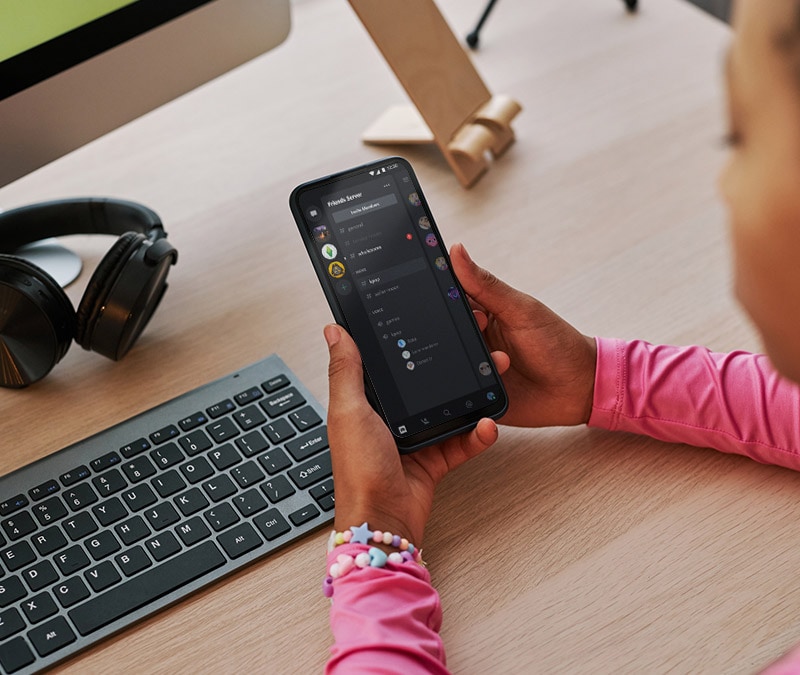5 ways to help protect your kids online, as more people are on lockdown
With more kids locked down at home, parents can help guide their children’s online exposure and behavior. Here’s how.


Try Norton 360 FREE 7-Day Trial* - Includes Norton VPN
7 days of FREE* comprehensive antivirus, device security and online privacy with Norton VPN.
Join today. Cancel anytime.
*Terms Apply
If you have kids, you probably want some control over what they do online. Think of the internet as a big city, but without an adequate police force. That’s where you come in.
Many families spend a lot of time at home — more so, recently, due to health concerns related to COVID-19, the disease caused by the coronavirus. At-home time often translates into more hours spent online. For kids, that might involve school, homework, socializing, entertainment, and gaming.
But not everything online — or every online activity — is well-suited for kids and teens. What can you do? You can help monitor online time and activities in various ways. You can set guidelines and check in with your kids to make sure they’re followed. You might also consider a parental-control app to help you manage some of these tasks.
If you're concerned about your children’s exposure to the internet, here are a few ways to help your kids stay safe when they go online.
1. Schedule screen time limits for kids and devices.
You might feel like your kids shuffle from one screen to the next throughout the day — spending time with smartphones, tablets, laptops, and TVs.
You might consider limiting and enforcing the number of hours per day or week your kids can use devices, the types of devices they can use, and what types of activities they can do or programs they can watch.
Talk with your kids so they can start understanding media literacy and practicing self-regulation. It's also a good way to discover what they like doing online, as well as suggest new TV shows and apps for them to try. You might schedule a regular family night that’s screen-free.
2. Monitor what your kids are doing online.
You might decide to let your kids get their own email address, set up social media accounts, and use the internet unsupervised. If so, it's a good idea to check in on what they're doing.
Let your kids know you're going to monitor their devices and why. Ask them to share their account passwords with you. Let them know it's not about snooping, it's about safety.
It can help to know what your kids are texting, downloading, searching, and watching. That knowledge could be used to open a line of communication.
For instance, your children might deal with an issue they don't know how to bring up. Or they may not know when they've encountered something unsafe online.
If they happen to run into inappropriate content or online behavior, you can talk with them about safety and what to do. Once your kids have a better grasp on how to safely use the internet, you might consider monitoring them less frequently.
3. Set rules about using social media.
Social media can be challenging for teens. On the one hand, it can help strengthen relationships. On the other, it can also distract them from in-person communication, potentially cause low self-esteem, and expose them to cyberbullying.
The effects of social media vary greatly. Collaborating on a group project over Google Hangouts or bonding with a new friend over Instagram can be beneficial. Scrolling through Snapchat for hours or dealing with Twitter trolls usually is not a great use of time. Talk with your kids about smart social media habits and the best ways to use their devices.
Encourage them to pay attention to how they feel before, during, and after they use social media. Talk about what's making them feel good or not-so-good. You can help them resolve issues, set social media limits, and use privacy features and content filters.
What else? You can model good habits by not spending too much time with your own smartphone.
4. Stay on top of information shared online.
Often, information is currency online. It’s can be a trade-off for services when browsing the internet, downloading an app, or signing up for a new online service. The risk? Children could unintentionally reveal too much if they don't understand how information is shared.
Get familiar with the websites your kids visit, the social media they use, and the apps they download. Read reviews. Check out the site's terms and conditions to see what kind of information the platform tracks and stores.
You can also download the apps, play around with them, and "friend" your child. That way, you can occasionally browse what your kids are publicly sharing online.
5. Limit access to websites.
Landing on an inappropriate website can be as easy as missing a keystroke or clicking on the wrong link. Depending on your child’s age and level of maturity, you might consider setting up restrictions on websites and the types of downloads you deem inappropriate. Continue teaching your kids how to evaluate trustworthy websites.
Bottom line
Keeping tabs on what your kids do online requires effort. Even so, it’s a good idea to take steps to monitor who they're talking to, where they go, and what they consume and download.
It's also a good idea to periodically discuss online citizenship and whether your kids still agree with the house rules. The goal is helping to keep your kids safe online while building safe and smart online habits.
If you find yourself spending more time with your kids at home — by choice or necessity — you’ll be glad you took the time to guide them online.

Try Norton 360 FREE 7-Day Trial* - Includes Norton VPN
7 days of FREE* comprehensive antivirus, device security and online privacy with Norton VPN.
Join today. Cancel anytime.
*Terms Apply
Editorial note: Our articles provide educational information for you. Our offerings may not cover or protect against every type of crime, fraud, or threat we write about. Our goal is to increase awareness about Cyber Safety. Please review complete Terms during enrollment or setup. Remember that no one can prevent all identity theft or cybercrime, and that LifeLock does not monitor all transactions at all businesses. The Norton and LifeLock brands are part of Gen Digital Inc.





Want more?
Follow us for all the latest news, tips, and updates.